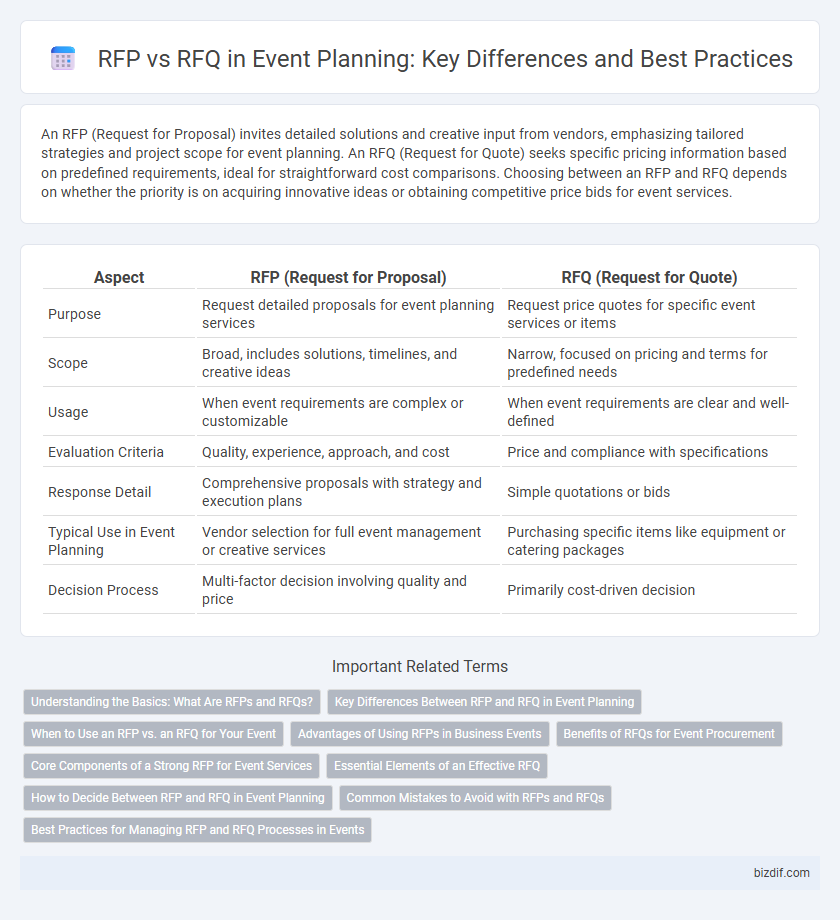An RFP (Request for Proposal) invites detailed solutions and creative input from vendors, emphasizing tailored strategies and project scope for event planning. An RFQ (Request for Quote) seeks specific pricing information based on predefined requirements, ideal for straightforward cost comparisons. Choosing between an RFP and RFQ depends on whether the priority is on acquiring innovative ideas or obtaining competitive price bids for event services.
Table of Comparison
| Aspect | RFP (Request for Proposal) | RFQ (Request for Quote) |
|---|---|---|
| Purpose | Request detailed proposals for event planning services | Request price quotes for specific event services or items |
| Scope | Broad, includes solutions, timelines, and creative ideas | Narrow, focused on pricing and terms for predefined needs |
| Usage | When event requirements are complex or customizable | When event requirements are clear and well-defined |
| Evaluation Criteria | Quality, experience, approach, and cost | Price and compliance with specifications |
| Response Detail | Comprehensive proposals with strategy and execution plans | Simple quotations or bids |
| Typical Use in Event Planning | Vendor selection for full event management or creative services | Purchasing specific items like equipment or catering packages |
| Decision Process | Multi-factor decision involving quality and price | Primarily cost-driven decision |
Understanding the Basics: What Are RFPs and RFQs?
RFPs (Request for Proposals) are detailed documents used in event planning to solicit comprehensive solutions and creative input from vendors, emphasizing the scope, objectives, and evaluation criteria. RFQs (Request for Quotes) focus on obtaining specific pricing information for clearly defined services or products, prioritizing cost comparison and budget adherence. Understanding these distinctions helps event planners choose the appropriate procurement method for vendor selection and project requirements.
Key Differences Between RFP and RFQ in Event Planning
In event planning, RFPs (Requests for Proposals) focus on soliciting creative solutions and comprehensive service packages, emphasizing vendor expertise, innovation, and strategic approach. RFQs (Requests for Quotations) prioritize obtaining detailed pricing information for defined products or services, such as venue rental or catering costs, enabling precise budget comparisons. The key difference lies in RFPs assessing qualitative factors and vendor capabilities, while RFQs concentrate on cost and straightforward specifications.
When to Use an RFP vs. an RFQ for Your Event
Use an RFP (Request for Proposal) when your event requires creative solutions, multiple service components, or customized execution plans from vendors. An RFQ (Request for Quote) is ideal for straightforward event needs with predefined specifications, such as venue rental or catering, where price comparison is the primary focus. Selecting the appropriate method ensures efficient vendor evaluation and aligns procurement processes with event goals.
Advantages of Using RFPs in Business Events
Using Requests for Proposals (RFPs) in business events allows planners to receive detailed and customized solutions from vendors, enhancing the quality and creativity of event services. RFPs encourage suppliers to offer innovative approaches tailored to specific event goals, resulting in more competitive pricing and value-driven packages. This method ensures comprehensive evaluation based on various criteria, fostering better decision-making and improved event outcomes.
Benefits of RFQs for Event Procurement
RFQs streamline event procurement by providing clear, itemized pricing, enabling easy comparison across multiple vendors for services like catering, AV equipment, and venue rentals. This transparency accelerates decision-making and budget adherence while minimizing scope creep during event planning. Event planners benefit from the structured format of RFQs, ensuring precise cost control and fostering competitive bidding.
Core Components of a Strong RFP for Event Services
A strong RFP for event services clearly outlines the project scope, detailed requirements, and evaluation criteria to ensure vendors understand expectations and can provide tailored proposals. It includes a comprehensive timeline, budget parameters, and specific deliverables to align vendor capabilities with event goals. Incorporating clear communication protocols and contract terms helps streamline vendor selection and execution processes.
Essential Elements of an Effective RFQ
An effective Request for Quotation (RFQ) in event planning must include clear specifications of goods or services, precise quantities, and detailed delivery requirements to ensure accurate vendor responses. It should outline specific deadlines for submission and clarify evaluation criteria, facilitating objective comparison of quotes. Including terms and conditions, pricing structure, and contact information further enhances vendor adherence and smooths the procurement process.
How to Decide Between RFP and RFQ in Event Planning
Determining whether to use an RFP (Request for Proposal) or RFQ (Request for Quote) in event planning depends on the complexity and scope of the event requirements. Choose an RFP when seeking detailed solutions, creative strategies, and vendor expertise for large-scale or customized events. Opt for an RFQ if the event needs are well-defined with specific deliverables and pricing is the primary decision factor for standardized services.
Common Mistakes to Avoid with RFPs and RFQs
Common mistakes to avoid with RFPs and RFQs in event planning include unclear specifications, which lead to vague proposals and inadequate vendor responses. Neglecting to establish evaluation criteria before distribution often results in inconsistent assessments and biased selection processes. Overlooking deadlines or failing to communicate changes promptly can cause delays and diminish vendor trust, impacting project timelines and quality.
Best Practices for Managing RFP and RFQ Processes in Events
Effective management of RFP (Request for Proposal) and RFQ (Request for Quotation) processes in event planning requires clear communication of event requirements and detailed evaluation criteria to ensure vendor alignment and competitive pricing. Utilizing digital platforms for centralized document handling and automated tracking enhances transparency and streamlines decision-making. Prioritizing vendor responsiveness and flexibility while maintaining strict adherence to deadlines contributes to successful event outcomes and cost efficiency.
RFP vs RFQ Infographic

 bizdif.com
bizdif.com